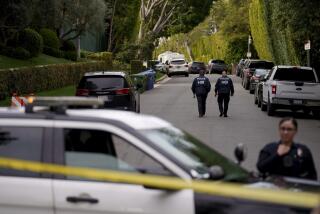A Comedy of Eros
- Share via
When I lived in New Orleans, I was told about a trial before one of our state judges in which a local madam appeared under a charge of assaulting an officer. The bordello was periodically subject to routine sweeps by the police to “keep up appearances.” The madam, however, was mistaken on the appointed time and, according to one arresting officer, slammed a swinging door in his face.
On cross-examination, the madam denied the allegation and insisted that there was no swinging door in that room. When the prosecutor expressed skepticism, the madam turned to the judge and said, “Judge, you know ... there is no swinging door in that parlor.”
The story captured the attitude of local authorities toward bordellos in Louisiana. In New Orleans, houses of ill-repute are some of the oldest institutions in the French Quarter and are often cited on tours as virtual cultural landmarks.
Prostitution itself is a misdemeanor, a law universally honored in the breach. This is a view not shared by Atty. Gen. John Ashcroft’s Justice Department.
This week, the Justice Department announced the results of a long investigation of a French Quarter bordello that serviced a virtual who’s who of New Orleans elite, including at least one judge.
For more than 13 months, the Justice Department has conducted a major investigation of this bordello, producing hundreds of pages of surveillance transcripts and reports by 10 FBI agents. With considerable fanfare, the Justice Department touted its “catch” in a news conference: 12 prostitutes.
Only the FBI could go to the French Quarter and find just a dozen prostitutes after a year of investigation. Given the roughly one-to-one ratio between agents and prostitutes, the FBI could have produced a hundred times this number by having agents walk down Bourbon Street.
In some parts of New Orleans, a “sting operation” for prostitutes requires the simple opening of a car door.
Of course, when the Justice Department convinced an unwitting judge to sign this surveillance order, it had promised something far more alluring. It insisted that the bordello would reveal mob dealings as well as criminal activities by an infamous gang. It further assured the judge that the bordello was a hot spot for major drug transactions.
Ultimately, the surveillance failed to nail a single mobster or gang member.
As for the drugs, the FBI carefully made a case against a 62-year-old woman who sold small amounts of marijuana for personal use at the location--often a joint at a time.
When confronted by the ludicrous “haul” of 12 prostitutes, the Justice Department was unapologetic and insisted that this was a major law enforcement victory. Federal prosecutor Sal Perricone spoke for the Justice Department when he pledged more of such enforcement.
‘We’ll seek it out, we’ll find it, we’ll grab it by the scruff of the neck, and we’re going to prosecute it,” Perricone said.
That is certainly reassuring. While it was revealed this week that the FBI largely ignored CIA identifications of known terrorists in the U.S. before Sept. 11, it appears that it was able to find prostitutes in New Orleans.
It simply boggles the mind how such an investigation could have been approved, let alone continued after the September attacks.
When these agents were carefully recording calls to a bordello, hundreds of other agents were being shifted from major crimes to homeland security. While Ashcroft was seeking expanded powers to listen in on suspected terrorists, these agents were listening to the descriptions of particular prostitutes and their special “capabilities.”
Agents carefully recorded the strict rates of $200 to $300 an hour and how the mother-daughter team that ran the bordello could barely pay their bills on their 50% take. The mother and daughter are now cooperating in the prosecution of their former “employees.”
None of the johns (including the judge, respected lawyers, stockbrokers, bankers and civic leaders) have been charged.
Though the Justice Department found federal crimes for the prostitutes, they could not imagine a federal crime for the johns.
Such matters, they explained, are strictly matters for local enforcement.
The Justice Department is half-right. It was all a matter for local concern.
The Justice Department insists that it had jurisdiction in this case because some of the prostitutes crossed state lines. However, this merely explains that the government could investigate, not that it should.
Most any crime today has some element that crosses state lines, but we expect the Justice Department to resist temptation.
One can certainly appreciate that it is more interesting to listen in on the supplying of sexual services than it is to eavesdrop on that of banking services. However, the Justice Department is expected to resist such calls of the erotic.
Like many tourists on Bourbon Street, the Justice Department simply stayed too long and paid too much in the Big Easy.
More to Read
Sign up for Essential California
The most important California stories and recommendations in your inbox every morning.
You may occasionally receive promotional content from the Los Angeles Times.













